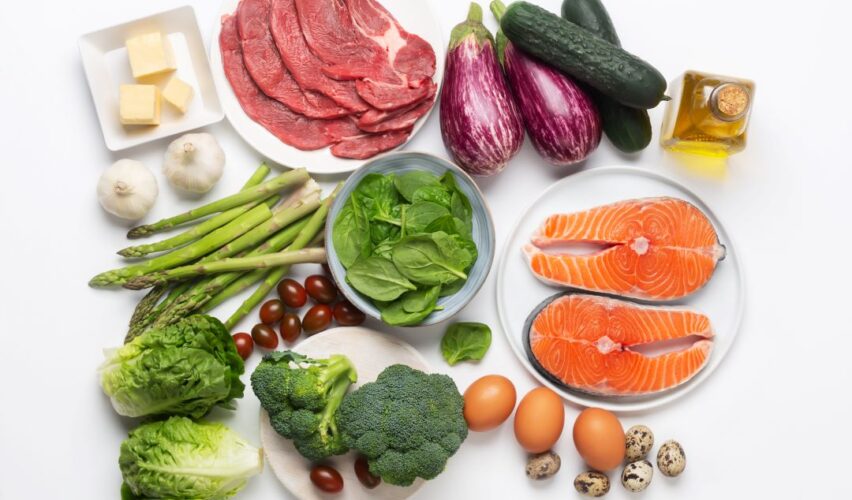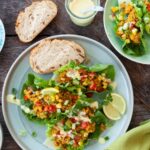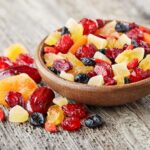Inflammation in the body can lead to several health issues over time. Many people are now turning to a High Protein Anti-Inflammatory Diet to help reduce inflammation while supporting muscle maintenance and overall health. This 7-day meal plan combines high-protein foods with anti-inflammatory ingredients for easy and effective meal preparation.
Understanding the High Protein Anti-Inflammatory Diet
A High Protein Anti-Inflammatory Diet focuses on increasing protein intake with foods that help lower inflammation. This diet is based on the concept that certain foods, referred to as anti-inflammatory foods, can help reduce inflammation markers in the body. Examples include lean proteins, legumes, fish alternatives, and various fruits and vegetables.
Key Benefits:
- Protein and Inflammation: Research shows that adequate protein intake supports muscle repair and can help manage inflammation. Protein can be essential to overall health when combined with foods that reduce inflammation.
- Balanced Nutrients: By following an anti-inflammatory meal plan, you can ensure that your diet is rich in vitamins, minerals, and antioxidants.
- Improved Recovery: A high-protein diet may aid in faster recovery from exercise and reduce chronic inflammation.
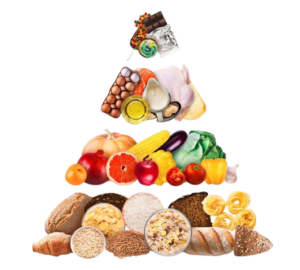
This plan also includes concepts such as the anti-inflammatory diet food pyramid and the anti-inflammatory diet pyramid, which emphasise the inclusion of various nutrient-dense foods while limiting those that may exacerbate inflammation.
The 7-Day Meal Plan Overview
Try this 7-day meal plan that includes three meals and snacks daily, focusing on high-protein, anti-inflammatory ingredients. It caters to both plant-based and protein-rich dietary preferences. Enjoy a week of simple, nutritious meals!
Day 1
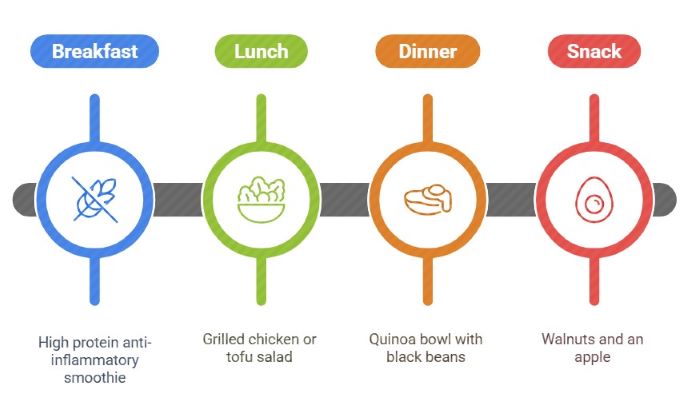
Breakfast:
- High protein anti-inflammatory breakfast: A smoothie made with plant-based protein powder, unsweetened almond milk, spinach, blueberries, and a spoon of chia seeds.
Lunch:
- Grilled chicken or tofu salad with mixed greens, tomatoes, cucumbers, and a light lemon-olive oil dressing.
Dinner:
- Quinoa bowl with black beans, roasted sweet potatoes, and steamed broccoli, topped with a turmeric and black pepper sprinkle.
Snack:
- A small handful of walnuts and an apple.
Day 2
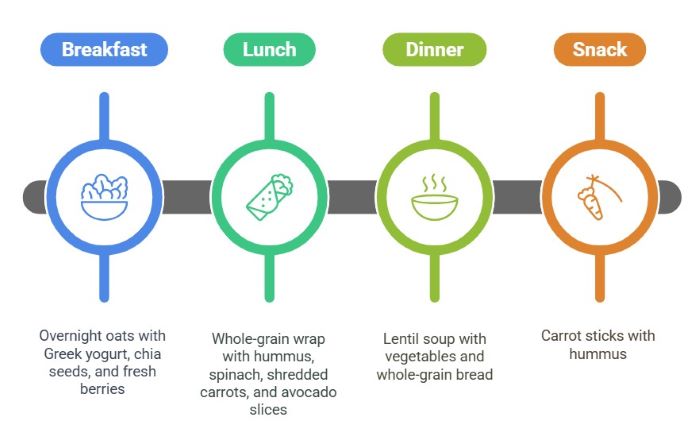
Breakfast:
- Overnight oats are prepared with Greek yogurt, chia seeds, and fresh berries.
Lunch:
- Whole-grain wrap with hummus, spinach, shredded carrots, and avocado slices.
Dinner:
- Lentil soup with diced carrots, celery, and tomatoes, seasoned with garlic and cumin. Serve with a slice of whole-grain bread.
Snack:
- Carrot sticks with a small serving of hummus.
Day 3
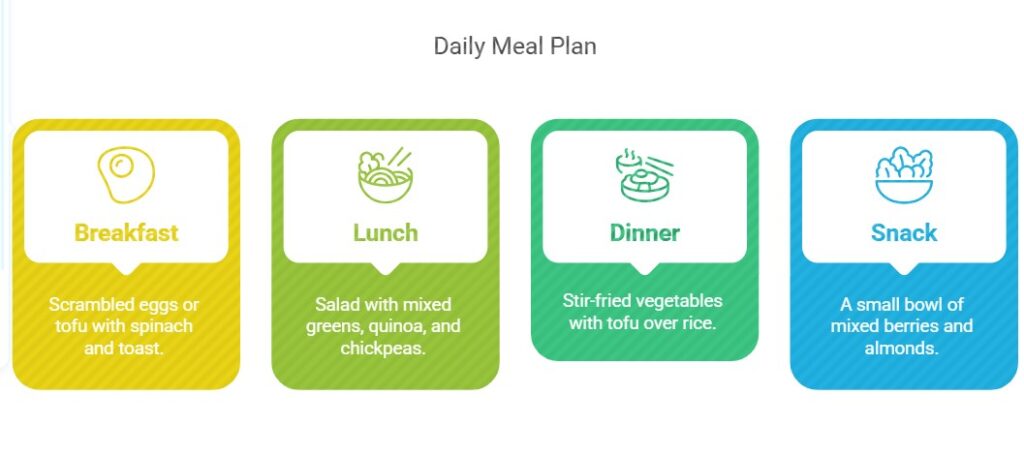
Breakfast:
- Scrambled eggs or tofu with spinach, tomatoes, and whole-grain toast.
Lunch:
- Salad with mixed greens, quinoa, chickpeas, and a light vinaigrette dressing.
Dinner:
- Stir-fried vegetables (broccoli, bell peppers, snap peas) with tofu or lean protein, served over brown rice.
Snack:
- A small bowl of mixed berries and a few almonds.
Day 4
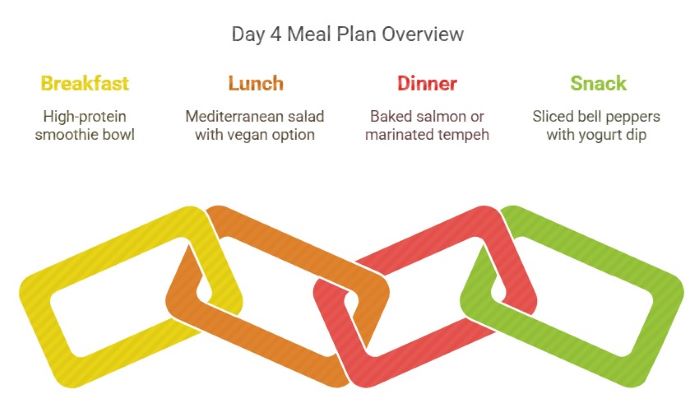
Breakfast:
- High-protein anti-inflammatory breakfast: A smoothie bowl with plant-based protein powder, banana, spinach, sliced strawberries, and flaxseeds.
Lunch:
- Mediterranean salad with tomatoes, cucumbers, olives, and feta cheese (a vegan alternative), drizzled with olive oil and lemon juice.
Dinner:
- Baked salmon (or marinated tempeh for a vegan option) with steamed asparagus and quinoa.
Snack:
- Sliced bell peppers with a light yogurt dip.
Day 5
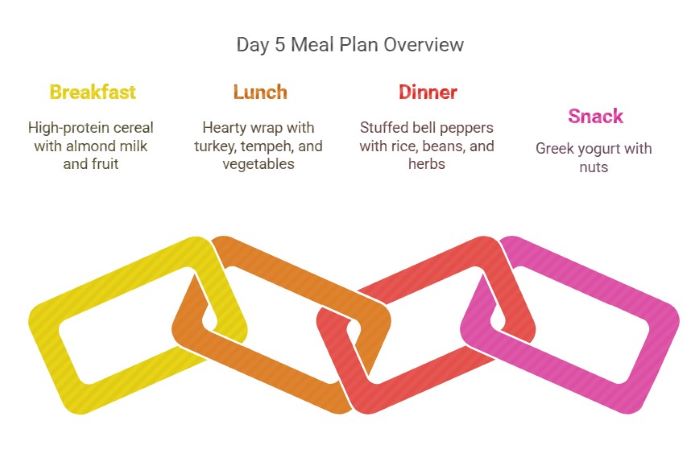
Breakfast:
- A bowl of high-protein cereal mixed with unsweetened almond milk and fresh fruit.
Lunch:
- A hearty wrap with lean turkey, tempeh, lettuce, tomato, and avocado.
Dinner:
- Stuffed bell peppers filled with brown rice, black beans, diced tomatoes, and herbs, baked until tender.
Snack:
- A small portion of Greek yogurt (or a plant-based alternative) with a sprinkle of nuts.
Day 6
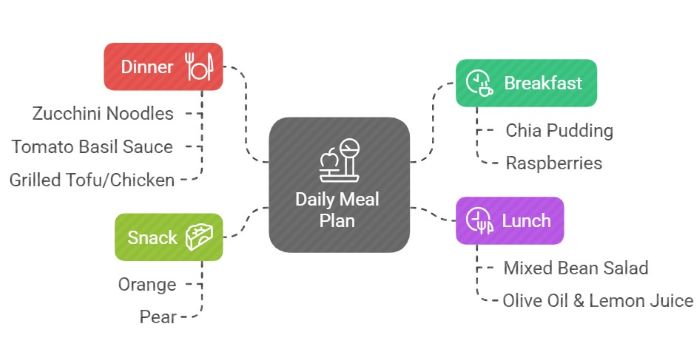
Breakfast:
- Protein-rich chia pudding made with unsweetened almond milk and chia seeds and topped with raspberries.
Lunch:
- Mixed bean salad with kidney beans, chickpeas, red onions, and parsley dressed with olive oil and lemon juice.
Dinner:
- Zucchini noodles tossed with tomato basil sauce and served with grilled tofu or chicken strips.
Snack:
- A piece of fruit such as an orange or pear.
Day 7
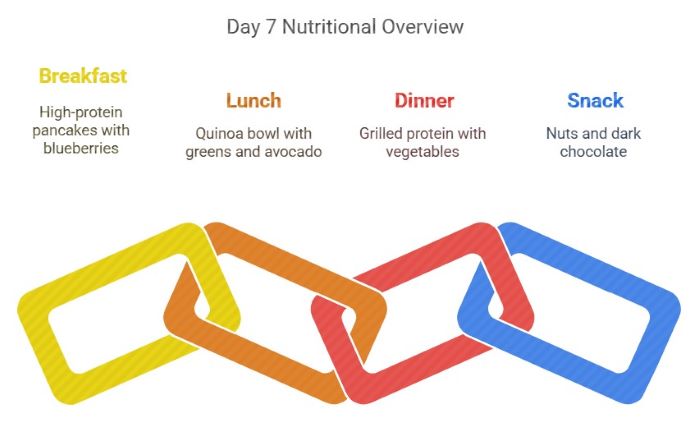
Breakfast:
- High-protein anti-inflammatory pancake stack made with whole-grain flour, eggs, or flaxseed mix, topped with a drizzle of honey and fresh blueberries.
Lunch:
- A nutrient-dense bowl with mixed greens, quinoa, roasted chickpeas, and sliced avocado.
Dinner:
- Grilled tempeh or lean protein with steamed green beans and sweet potato mash.
Snack:
- A handful of mixed nuts and a small piece of dark chocolate.
In The Final moments
Following a high-protein anti-inflammatory diet for seven days can be an effective way to reduce inflammation and enhance your overall health. The focus is on lean proteins or plant-based alternatives combined with whole foods known for their anti-inflammatory properties.
Adopting this meal plan can support your body’s natural healing processes and contribute to better long-term health. Remember, changes in diet should be paired with other healthy lifestyle choices, such as regular exercise and adequate sleep.
If you find this plan helpful, consider sharing it with others looking to reduce inflammation naturally.
Next Blog: Easy Vegetarian Lunch Recipes
Frequently Asked Questions
Does a high-protein diet reduce inflammation?
Research indicates that a high-protein diet with anti-inflammatory foods can lower inflammatory markers. Choosing lean or plant-based proteins is recommended, as they are less likely to cause inflammation than processed meats.
What are the best proteins for an anti-inflammatory diet?
In a high-protein anti-inflammatory diet, include lean proteins like chicken, fish, and eggs. For plant-based diets, opt for tofu, tempeh, legumes, and plant-based protein powders to get high protein without added saturated fats.
How can I reduce inflammation in 7 days?
A structured meal plan featuring high-protein, anti-inflammatory recipes is a great start. Reducing processed foods and sugars while focusing on whole, nutrient-dense ingredients can help lower inflammation over time.

